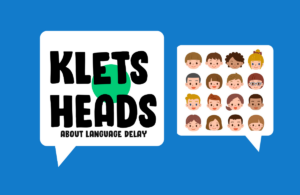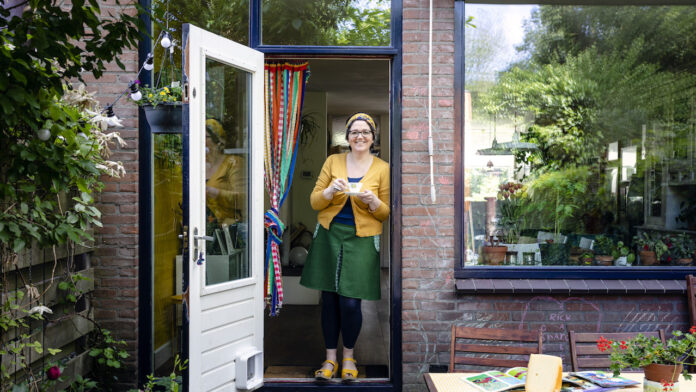Sharon Unsworth and Aniek Ebbinge explain how to detect language delays in your bilingual child. How do you know if your bilingual child has a language delay?
This article is based on an episode of the Kletsheads podcast, all about language delay. Kletsheads is a podcast about bilingual children for parents, teachers, and speech-language therapists. In each episode, Dr Sharon Unsworth, a linguist at Radboud University, Nijmegen, and mother of two children (both bilingual, of course), discusses the science behind the language development of bilingual children with another expert. There are practical tips, interviews with children about what it’s like growing up with two or more languages, and parents and professionals about their experiences with bilingual children.
Toilet-training, teething, learning to ride a bike: some children are quick to reach each of these milestones, whereas others are much slower. The differences between children can be huge. Such significant differences also exist when it comes to language development. While some children produce their first word at nine months already, others may be twice as old when they start talking. Given all these differences, how do you know when your child’s not making enough progress? What should you do as a parent or teacher of a bilingual child if you’re worried about their language development in one of their two languages, or perhaps even in both? At what point is it wise to contact a professional such as a speech-language therapist? And if you are such a professional, what is the best way of approaching assessment in bilingual children?
You often hear that bilingual children are slower to learn their two languages than monolingual children. People refer to this as a language delay (taalachterstand in Dutch). Language delay is used in different ways by different people, and so it’s not always clear what this term means. Often, language delay is used to refer to a child who is lagging in his/her language development in the language used at school, so that would be Dutch here in the Netherlands. For bilingual children, such a delay maybe because they have less contact with the school language than their monolingual peers, perhaps because they only started learning Dutch at school, or because they don’t use that language at home.
At the same time, having a language delay can also mean that something else is going on, namely that the child has what’s called a developmental language disorder, often abbreviated to DLD. DLD is a condition that affects one in fifteen children and is just as common in bilingual children as it is in children growing up with just one language. A child with DLD has problems with analyzing language. They might leave out sounds (for example, saying “nana” instead of “banana”), or they might have difficulty asking questions or understanding what is being said. The most important thing to note is that bilingual children with DLD have problems in all of their languages. So, if your child is delayed in one of their languages relative to their monolingual peers, this probably means that they won’t have DLD.
Some children may be late bloomers, and they will catch up with their peers as they get older. However, when children get older and still continue to lag (in all their languages), this might be a sign that they have a developmental language disorder. It’s important to stress that language delay may indicate an underlying disorder, but in order to make the correct diagnosis, a full range of assessments and observations need to be carried out by a speech and language therapist. This takes time since there is no blood test or scan that will simply tell you that your child has DLD. For bilingual children, the diagnosis is even more complicated because they need to be assessed in both languages.
When having bilingual children’s speech and language development assessed, it is crucial that assessments are done in all the languages they are learning. This might mean getting a second speech-language therapist involved, someone who can speak the language in question and who has access to the appropriate tests in that language. It may also include asking you questions about how well your child speaks your language, the kinds of “mistakes” they make in that language, and how well they understand you when you speak to them. Remember that a diagnosis of DLD based on one language only will be incomplete at best, inaccurate at worst.
The Dutch national network https://www.meertaligelogopedie.com/ is an excellent place to start when looking for a multilingual speech-language therapist in your neighbourhood. Their website contains a map where you can search by location and language for therapists who are able to assess and treat children in multiple languages.

Kletsheads
When should you talk to a speech and language therapist about your child’s language development? If you are concerned, it is always a good idea to speak to a professional. It’s difficult to compare children to each other because there is so much variation between them, but roughly speaking, your child should be using their first words between 12 and 18 months. From their first words, they should be acquiring new words very quickly and by about two years, children should start to combine words. If your child doesn’t appear to be following this path in either language, it’s a good idea to ask a professional for advice. Most speech-language therapists would prefer for you to go to them when your child is young, even if they simply tell you that there’s no reason to worry, rather than when your child is much older and may have been struggling for a while.
In short, then, having a developmental language disorder is something different from not being able to speak the school language very well. Bilingual children are just as likely or unlikely to have such a disorder as their monolingual peers. If you’re a parent and you’re worried about your child’s language development, get in touch with a speech-language therapist and ask them to have a chat with your child. And if you’re a speech-language therapist, make sure you assess both the child’s languages.
For Eindhoven News: Sharon Unsworth and Aniek Ebbinge
Find out more at kletsheadspodcast.org or search for Kletsheads [English edition] in your favourite podcast app.
















